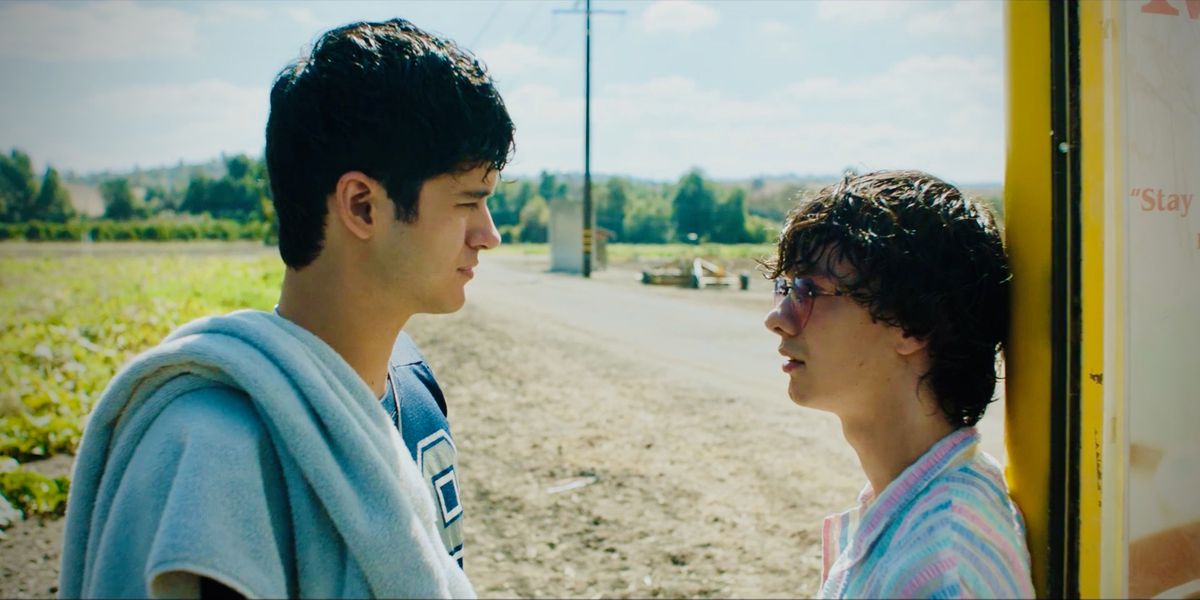Movie Review: ‘Aristotle and Dante Discover the Secrets of the Universe’ is a powerful coming-of-age story

“They talk about magic but I never believed in it until Dante.” That sentence, and sentiment, is simple but sneakily powerful, evoking the kind of epic, all-consuming feelings of teenagers and the way they approach love, life, and friendship during that heady transitional time. The year is 1987, the place is El Paso, Texas, and the person who has just discovered Dante (Reese Gonzales) is Aristotle (Max Pelayo). This is “Aristotle and Dante Discover the Secrets of the Universe,” a coming-of-age drama based on the young adult novel by Benjamin Alire Sáenz.
“Aristotle and Dante Discover the Secrets of the Universe,” the movie, is written and directed by Aitch Alberto, who has transposed Sáenz’s emotional and intimate prose to the screen. It’s a traditional teenage growing-up story, filled with angst and crushes and family discord as lonely Aristotle grapples with his identity in relationship to others. But it is unique in its setting, the people within it and the issues that it takes on.
Aristotle’s world tilts on his axis when he meets Dante at the swimming pool during the aforementioned magic moment. The boys bond over their unique names, and Aristotle is drawn in by Dante’s gentle, open temperament, so different from the toxic masculinity embodied by the threat of other boys, or his emotionally repressed father (Eugenio Derbez).
Dante, the son of an English professor (Kevin Alejandro) and an expressive, loving mother (Eva Longoria), is creative and soft; he draws Aristotle out of his shell despite his friend’s misgivings about how they might be perceived by others. But soon the two are separated, with Dante heading to Chicago with his parents for a year, and Aristotle left to fend for himself with the gossips and gangbangers at school. He shapes and conforms himself to the Texan ideal, working out, driving an old truck, enjoying the acceptance and attention he garners from the girls.
Aristotle has few examples of alternatives to the machismo he feels pressured to exude, but as he discovers, queerness is all around him, in various forms, both unspoken, and spoken, eventually, in letters from Dante, as his friend comes to terms with his own sexuality in the big city. But that queerness is also laced with danger and violence, in forms that hit too close to home for Aristotle.
Sáenz is a poet, and his lyricism is reflected in his prose, littered throughout the film in Aristotle’s narration and Dante’s letters. But that lyricism is also reflected in the look and feel of the film, which is shot through with the aching poignancy of youth and memory, the temporality of the seasons, the fleeting nature of golden hour, moments frozen in the amber glow of headlights and lamplight; time suspended underwater in a chlorine-scented turquoise sanctuary. Sunlight and raindrops dapple the frame, and the soundtrack is filled with period (and mood) specific ‘80s new wave (layering Bronski Beat over slow-mo shots of high school hallways and longing looks is an undefeated filmmaking hack).
Pelayo and Gonzales tackle these complex roles with bravery and vulnerability. We seem to watch Pelayo as Aristotle grow up on screen before our very eyes, while Gonzales as Dante serves as the emotional anchor even though his presence is often ephemeral. The stories of growing up and finding yourself remain the same, but it’s the moving performances and specific details embroidered on this one that makes it so special.